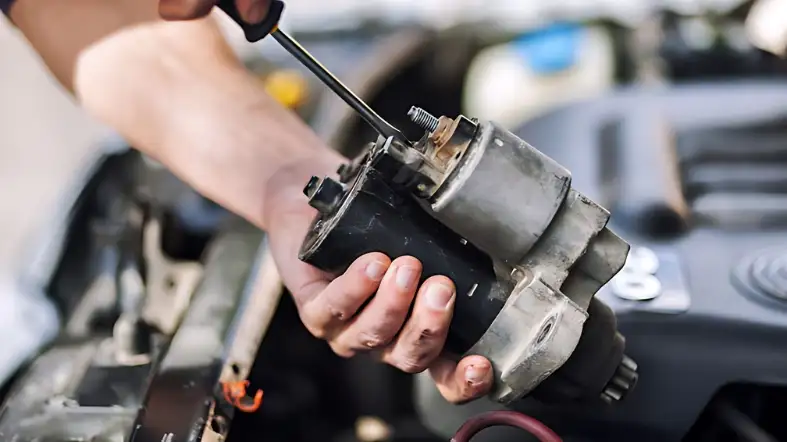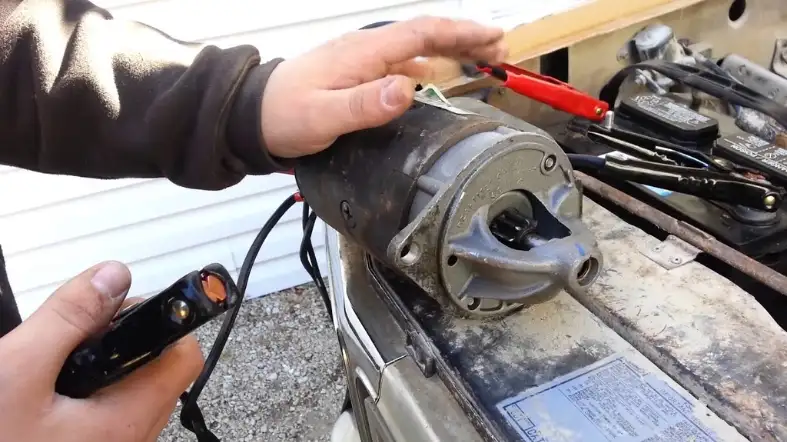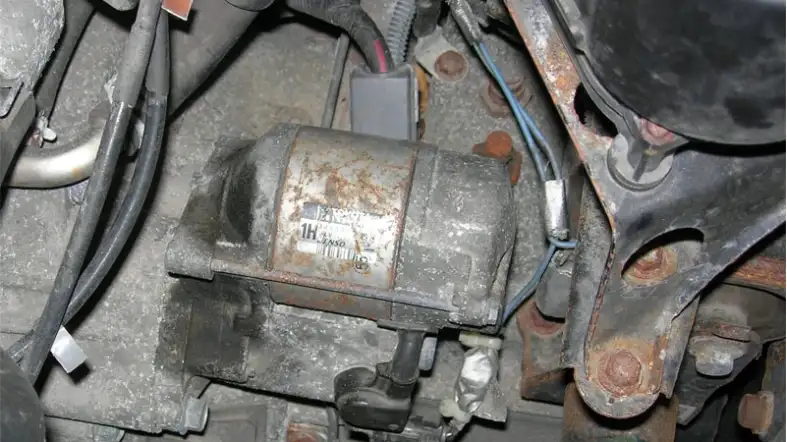Whether you are a new driver or a seasoned one, we have all been there – turning the key and hearing the dreaded sound of a struggling engine.
It’s the moment when you realize that something is not right, and you start to wonder: do I have a bad starter?
But how can you tell if it’s the starter causing the issue? In this blog, we’ll walk you through the signs of a bad starter and what you can do to fix it.
How can you tell if you have a bad starter?
Your car’s starter is responsible for initiating the engine’s combustion process, and if it’s not functioning properly, it can be a major issue.

Here are some signs that your car’s starter might be going bad:
1. The engine won’t start:
The most evident indication of a bad starter is when the engine fails to start after turning the key in the ignition.
When you attempt to start the car, you might hear a clicking noise, but the engine does not turn over.
This suggests that either the starter is not engaging properly with the engine or it is not receiving sufficient power.
2. Slow cranking:
If the engine does manage to start, but it takes longer than usual to do so, it could indicate a struggling starter.
The delay in engine ignition may be due to a weak battery or a faulty starter motor.
When the starter has difficulty engaging with the engine, it can lead to slow cranking.
3. Grinding noise:
When you turn the key in the ignition and hear a grinding noise, it could be a warning sign of a misaligned starter motor gear and the engine’s flywheel.
This misalignment can cause damage to both the flywheel and the starter gear.
If you encounter this noise, it is crucial to have it inspected promptly to prevent further complications.
4. Electrical issues:
Experiencing additional electrical problems, such as dimming headlights or a weak horn, may indicate that the starter is not receiving sufficient power.
The faulty starter motor, weak battery, or other electrical issues can contribute to this problem.
It’s important to address these electrical issues promptly to ensure the proper functioning of the starter and other electrical components.
5. Smoke:
Observing smoke coming from the engine area is a serious concern, as it could indicate an overheating starter motor.
This overheating can be caused by a faulty starter, a damaged starter relay, or other underlying issues.
If you notice smoke, it is essential to take immediate action and have your vehicle inspected to prevent further damage.
What Causes a Bad Starter?

When you turn the key to start your car and hear a grinding or clicking sound, it could be a sign that your starter is failing.
A starter is an electrical motor that helps to initiate the engine’s combustion process, and when it malfunctions, it can cause problems that prevent your vehicle from starting.
Here are some common causes of a bad starter:
1. Battery issues:
One of the most common causes of a bad starter is battery-related problems.
A weak or dead battery can put a lot of strain on your starter motor, causing it to fail.
If your battery is not holding a charge or is damaged, it can cause problems with the starter.
It’s important to regularly check your battery’s health and ensure it is properly charged and functioning.
2. Faulty starter solenoid:
The starter solenoid is an electrical switch that sends power to the starter motor.
It plays a crucial role in the starting process. If the solenoid fails, it can prevent the starter from receiving the necessary electrical current to function properly.
A faulty solenoid may result in a clicking sound when you turn the key.
3. Corrosion:
Over time, the electrical connections on your starter can become corroded due to exposure to moisture and other environmental factors.
Corrosion can prevent the starter motor from receiving the necessary power to start the engine.
Regular maintenance and cleaning of electrical connections can help prevent this issue.
4. Worn out brushes:
The starter motor uses brushes to transfer power from the battery to the motor.
These brushes make contact with the armature, allowing the flow of electricity. However, over time, these brushes can wear out due to friction.
When the brushes are worn out, they may not make proper contact, leading to a malfunctioning starter.
Regular inspection and replacement of worn-out brushes are essential to maintain the starter’s performance.
5. Overheating:
Starter motors can generate a significant amount of heat during operation.
If the cooling system fails to dissipate this heat effectively, the starter motor may overheat.
Overheating can cause damage to the internal components, such as the windings and bearings, leading to a failure of the motor.
Ensuring proper cooling system maintenance and addressing any cooling-related issues promptly can help prevent starter overheating.
6. Mechanical issues:
Apart from electrical components, mechanical problems can also contribute to a bad starter.
Any issues with the internal mechanical parts of the starter motor, such as a seized bearing or a broken gear, can cause the starter to fail.
Regular maintenance, including lubrication and inspection of mechanical components, can help identify and address such issues before they lead to complete starter failure.
How to Diagnose a Bad Starter?

Here’s how you can diagnose a bad starter:
1. Check the Battery:
The first step in diagnosing a bad starter is to check the battery. The battery provides the initial power required to start the engine.
If your battery is dead or low on charge, your car won’t start.
To check the battery, you can use a voltmeter, a device that measures electrical voltage.
Connect the voltmeter to the battery terminals, ensuring the positive and negative terminals are correctly aligned. The voltmeter will display the voltage of the battery.
A healthy battery typically has a voltage of around 12.6 volts or higher. If the voltage is significantly lower, it indicates a weak or discharged battery.
2. Listen for Sounds:
When you turn the key to start your car, listen for any sounds coming from the engine compartment.
A bad starter will often make a distinct clicking noise when you turn the key. This clicking noise indicates that the starter is not engaging properly.
In some cases, a grinding noise may be heard when attempting to start the car.
This could be a sign that the starter gear, called the pinion gear, is worn out and not properly engaging with the engine’s flywheel.
If you hear a grinding noise, it is likely that the starter requires attention or replacement.
3. Check the Connections:
Check the connections between the battery and the starter. The starter is connected to the battery through electrical cables.
Over time, these connections may become loose or corroded, leading to difficulties in starting the car.
Inspect the battery terminals and the terminals on the starter for any signs of corrosion or looseness.
Corrosion appears as a greenish or whitish substance on the metal surfaces.
Use a wire brush to clean the terminals and ensure a good connection. Additionally, tighten any loose connections using a wrench or pliers.
4. Test the Starter:
If you’ve ruled out the battery and connections as the problem, it’s time to test the starter itself. Testing the starter will help determine if it is functioning properly.
To test the starter, you will need the assistance of another person.
Have them turn the key to the start position while you measure the voltage at the starter using a voltmeter.
Connect the voltmeter to the starter’s positive and negative terminals, ensuring proper alignment.
When the key is turned, the voltmeter will display the voltage being supplied to the starter.
If the voltage is significantly lower than the battery voltage, it indicates a potential issue with the starter.
5. Check for Corrosion:
Corrosion can affect the performance of the starter.
Over time, moisture and other contaminants can cause corrosion to develop on the starter’s electrical connections and surfaces.
This corrosion can interfere with the flow of electricity, leading to starter malfunctions.
Inspect the starter for any signs of corrosion, both on the terminals and the body of the starter.
If you notice corrosion, use a wire brush to gently scrub away the buildup. Be careful not to damage any delicate components during the cleaning process.
6. Get a Professional Diagnosis:
If you have followed the previous steps and are still having trouble starting your car, it is advisable to seek the assistance of a professional mechanic.
A mechanic will have the knowledge and tools necessary to perform a comprehensive diagnosis of your car’s starting system.
By examining the starter and conducting additional tests, the mechanic can accurately determine if the starter is indeed faulty and needs to be replaced.
They will also be able to identify any other potential issues that may be affecting the starting system.
Getting a professional diagnosis will ensure that the correct repairs are performed, saving you time and effort in the long run.
FAQs
Q. Can You Replace A Starter Yourself, Or Should You Take It To A Mechanic?
A: While it’s possible to replace a starter yourself if you have some mechanical knowledge and the right tools, it’s often easier and safer to have a professional mechanic do it for you.
Starter replacement typically involves removing a few components from the engine bay, and it can be difficult to access the starter in some vehicles.
Plus, if you accidentally damage any other parts during the replacement process, you could end up with even more expensive repairs to deal with.
It’s usually worth the extra cost to have a trained mechanic handle the job.
Q. How Can You Prevent Starter Problems In The Future?
A: One of the best ways to prevent starter problems is to take good care of your car’s battery.
A weak or dead battery can put a strain on the starter and cause it to fail prematurely.
Make sure to have your battery checked and replaced as needed, and be sure to turn off any electrical accessories (like the radio and headlights) when you’re not using them.
Avoid frequently starting and stopping your car, as this can wear out the starter more quickly.
Finally, be sure to have your car regularly serviced by a qualified mechanic to catch any potential problems before they become serious.
Q. Can A Bad Starter Damage Other Parts Of My Car’s Engine?
A: In some cases, a bad starter can cause damage to other parts of the engine.
For example, if the starter is constantly grinding against the flywheel, it can cause damage to both components.
Additionally, if the starter is causing a drain on your car’s battery, it can lead to other electrical issues over time.
Conclusion
There are a few tell-tale signs that can indicate you have a bad starter in your vehicle.
If you experience difficulty starting your car, hear a clicking noise when turning the key, or notice that your lights and accessories are not working properly, it may be time to check your starter.
Additionally, if you have an older vehicle or have not had your starter inspected in a while, it’s a good idea to have it checked by a mechanic to ensure it is functioning properly.
Remember, a bad starter can lead to more serious problems down the road, so it’s best to address any issues early on.
